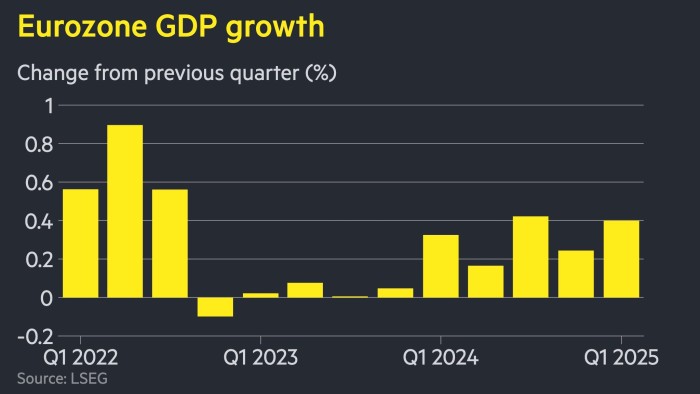Stay informed with free updates
Simply sign up to the Eurozone economy myFT Digest — delivered directly to your inbox.
The Eurozone economy grew 0.4 per cent in the first three months of the year, surpassing expectations, ahead of Donald Trump’s sweeping tariff announcements in early April.
The figure was twice as high as the 0.2 per cent of the previous quarter, according to a flash estimate by Europe’s statistical office Eurostat. Economists polled by Reuters had predicted that GDP growth would remain at that level.
The higher growth was more “more show than substance,” Commerzbank economists wrote in a note to clients, adding that it was partly driven by one-off effects including a 3.2 per cent growth spurt in Ireland.
The country’s GDP numbers are particularly volatile due to a large number of US multinational companies that process non-US revenue through Irish subsidiaries. Commerzbank calculated that, excluding Ireland, Euro area GDP would have grown by 0.3 per cent.
Most analysts expect that the global trade war unleashed by the US president on “liberation day” on April 2 will damage the Eurozone’s subsequent economic performance.
Survey data in recent weeks has indicated that business confidence in the Eurozone had deteriorated significantly since the US president unveiled the duties, while growth has approached zero.
“Growth will slow in [the second quarter], as the recent surge in trade policy uncertainty hits investment,” Melanie Debono, an economist at Pantheon Macroeconomics, wrote in a note to clients.
She added that “a short and shallow technical recession” in the euro area in the second half of the year was possible.
The euro was little changed after Wednesday’s data release at $1.137.
The European Central Bank lowered its 2025 growth prediction to 0.9 per cent last month — its sixth consecutive reduction — and is expected to lower it further in its updated forecasts in June.
The central bank warned that the outlook for growth had “deteriorated owing to rising trade tensions” when it cut interest rates in April to 2.25 per cent — the seventh reduction since June.
Traders in swaps markets assign a roughly 85 per cent chance to a further cut at the ECB’s next meeting in June, the same probability as before the publication of Wednesday’s GDP figures.
Figures released earlier on Wednesday showed that the German economy grew by 0.2 per cent in the first quarter compared with the previous three-month period, in line with expectations.
Europe’s largest economy had contracted by 0.2 per cent in the final quarter of 2024.
“Unfortunately, the figures are in large part more a reflection of the past than an indication of the future,” said Sebastian Dullien, head of Berlin-based think-tank IMK, on Wednesday, after the German first-quarter data was published.
France’s economy barely grew in the first quarter, rising by 0.1 per cent, having contracted by 0.1 per cent in the final three months of 2024.




![Why are England players and fans wearing white headbands on Day 2 of ENG vs IND 2025 5th Test? [In Pictures]](https://joelgalvan.site/wp-content/uploads/2025/08/11ea9-17540442452664-1920-768x512.jpg)


